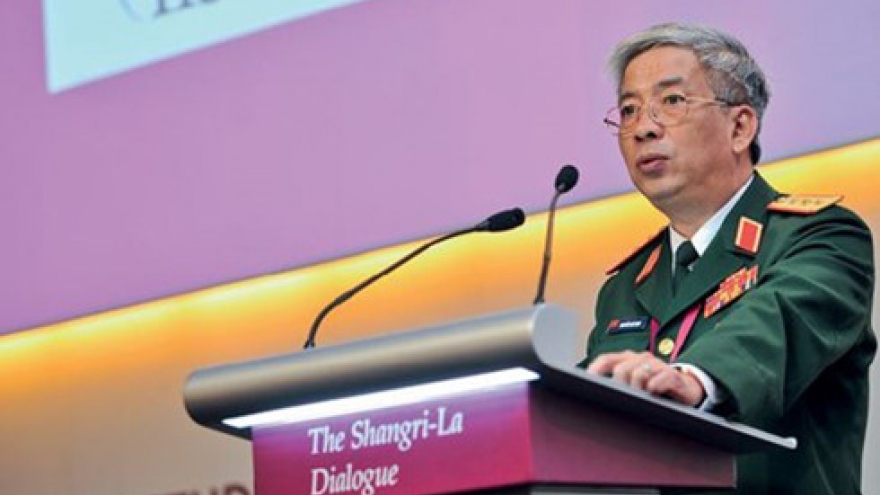Shangri La Dialogue: Promoting mechanisms to prevent risk of conflicts
VOV.VN -The 15th Shangri La Dialogue this year aims to promote effective cooperation mechanisms among regional countries and those concerned in order to prevent the risk of conflicts and to ensure peace and stability for development and prosperity.
 |
| Deputy Defence Minister Nguyen Chi Vinh leads a Vietnamese military delegation at the 15th Shangri La Dialogue |
The 15th Shangri La Dialogue with the largest-ever numbers of experts and scholars is transpiring in Singapore June 3-5 in the context of more complicated security in the Asia – Pacific region.
Experiencing the 15-year path of its development, Shangri La has played a crucial role in ensuring regional security in which not any other forums can deny or compare. This is seen as a venue for politicians, diplomats and defence officials to share their views as well as evaluating the regional security situation in order to establish a framework for more effective cooperation.
Over the past year since the 14th Shangri La Dialogue, the security situation in the Asia -Pacific region remained relatively stable as a result of cooperation mechanisms to settle and prevent conflicts, experts said.
However, there are still a lot of implicit uncertainties leading to regional security instability and this requires a new cooperation framework to maintain true peace and stability in the region and deal with the risk of conflicts in the East Sea.
The East Sea is not only a matter of individual ASEAN and China but also regional countries, becoming an international issue that has captured the special media attention at the 15th Shangri La Dialogue.
All of the countries concerned such as the US, Japan, Australia and New Zealand, have always showed their keen interest in the East Sea issue. The involvement of major powers is bringing development opportunities for smaller countries in the Asia - Pacific region, but also posing new challenges.
As a regional central organization grouping small countries, ASEAN is facing problems managing the relationship among big countries to cope with challenges while stepping up broader cooperation.
 |
| Vu Tien Trong, Director of the Institute of International Relations under the Ministry of Defence responds to reporters on the sidelines of the dialogue |
Vu Tien Trong, Director of the Institute of International Relations under the Ministry of Defence said, "The only solution for ASEAN is to maintain a strategic balance and always to promote the spirit of self-reliance to steer the existing security structure on the right course in which large and small countries must support and comply with the standards of international practice and law to maintain peace and stability in the region."
ASEAN is adopting a number of bilateral and multilateral cooperation mechanisms to prevent conflicts in the region, including the East Sea issue. But these mechanisms are not strong enough for legally binding legal frameworks to prevent the risk of conflicts.
 |
| Domestic and foreign reporters are performing their tasks |
ASEAN Secretary General Le Luong Minh said the Declaration on the Conduct of Parties in the East Sea (DOC) in 2002 has not been implemented fully and effectively, so relevant parties should have more political and diplomatic commitments to implement the DOC towards remarkable progress in negotiating the Code of Conduct of Parties in the East Sea (COC). Meanwhile, ADMM +, an idea conceived from the Shangri La Dialogue has taken shape and entered more substantive cooperation.
According to Dr. Ha Hoang Hop, senior political expert of the Institute of Southeast Asian Studies (Yusof Ishak Institute) of Singapore, ASEAN's consensus is very important, but cannot decide all.
“The decisive factor is that the parties concerned need to respect international law and have a common voice from which they can find out the best peaceful resolution to disputes,” he noted.
On the sidelines of the event, Deputy Minister Nguyen Chi Vinh held bilateral meetings with delegations from the US, Singapore, Australia, New Zealand, China, Canada, the UK, and Italy.
At a meeting with Assistance to US Defence Secretary David Shear, Vinh urged for expanding the Vietnam-US defence cooperation for mutual benefit. Vinh said he hoped the US would realize its commitments to help Vietnam in participating in the UN Peacekeeping Mission, overcome war aftermaths, detoxify the Bien Hoa airport, and announce the map of UXO in Vietnam.
David Shear stressed the importance of deepening bilateral ties and promised to support Vietnam in participating in the UN peacekeeping mission and addressing war aftermaths.
At a meeting on the same day, Deputy Defense Minister Senior Lieutenant Vinh and Australian Defense Commander General Mark Binskin agreed to expand cooperation in strategy research, increase connectivity between research institutes and scholars of both countries.
Meeting Deputy Chief of the General Staff of the China People's Liberation Army Admiral Sun Jianguo, Vinh urged the two countries to strengthen cooperation between border soldiers, organize border exchange activities, and conduct deputy ministerial strategic dialogues.
He said both sides need increase cooperation in navy and marine police to create a peaceful and stable environment between Vietnam and China. Admiral Sun Jianguo asked the two Defense Ministries to exchange experience in participating in the UN peacekeeping mission, and promote exchanges and dialogues.

